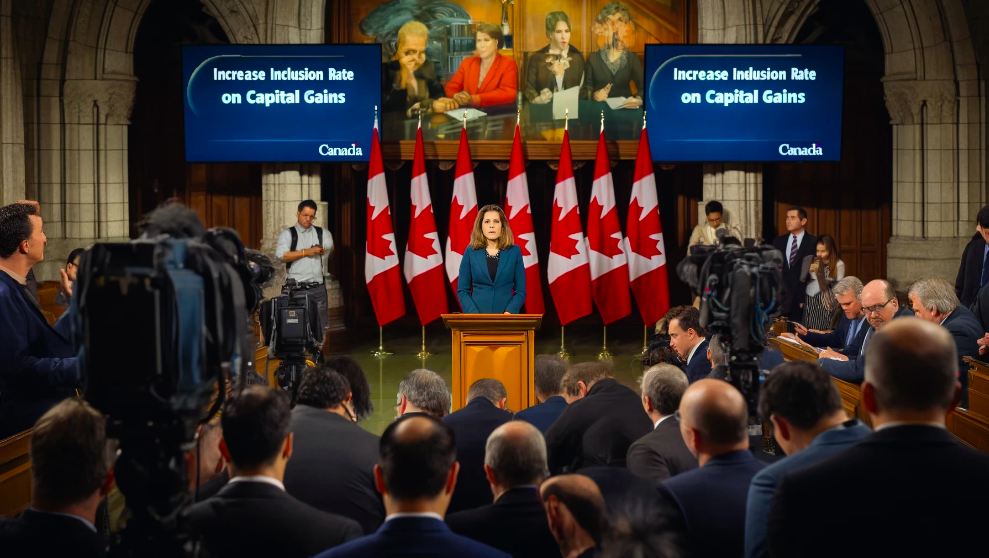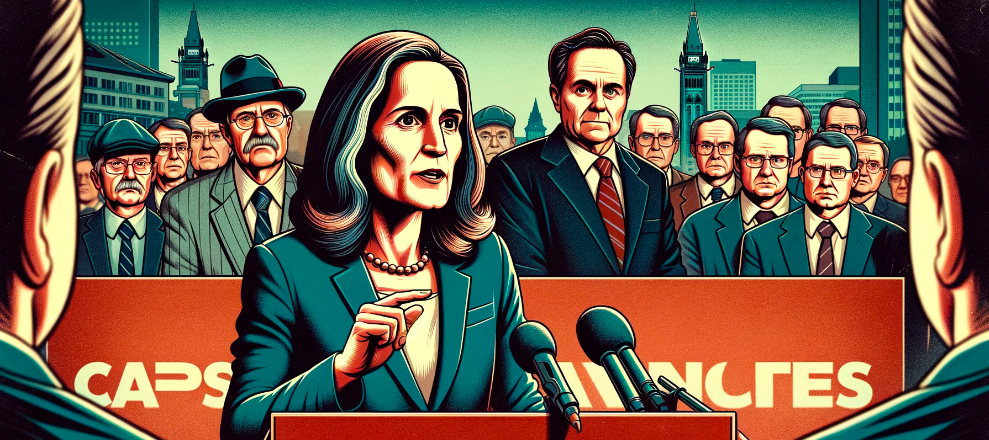- The capital gains tax increase will take effect on June 25, regardless of the bill’s passage.
- The new inclusion rate is expected to generate $19.4 billion over the next five years, providing substantial funds for public services.
- The proposal forces federal parties to take a clear stance, influencing political dynamics and voter perceptions.
Finance Minister Chrystia Freeland announced that the Liberal government plans to present its proposal to increase the inclusion rate on capital gains to the House of Commons before the parliamentary summer break. This move aims to advance their legislative agenda on tax reform.
Legislative Process and Implementation
Freeland confirmed during a news conference, “In the coming weeks, and certainly before the House rises, we will begin the legislative process to implement our increase in the inclusion rate.” The capital gains tax changes were initially announced in the April budget, yet the new inclusion rate was conspicuously absent from the budget legislation tabled last month. To proceed, the Liberals must first table a motion in the House of Commons before introducing the actual legislation. The government has indicated that even without the bill being passed, the changes will come into effect on June 25, underscoring the urgency and determination behind this fiscal policy shift.

Proposed Changes and Impact
The proposed changes will increase the taxable portion of capital gains to two-thirds, up from the current rate where only one-half of the profits from asset sales—such as stocks or secondary real estate properties—are taxed. This change is designed to affect different groups in distinct ways: all capital gains realized by corporations will face the higher inclusion rate, while individuals will only encounter this rate on gains exceeding $250,000. The rationale behind this tiered approach is to target higher earners and corporations more directly, which the government believes will enhance fairness in the tax system. According to government estimates, this new inclusion rate is expected to generate $19.4 billion over the next five years, providing significant revenue to support public services like housing and healthcare.
Reactions and Political Stance
The capital gains tax proposal has sparked considerable debate and opposition, particularly from lobby groups representing businesses and physicians, who argue that the increased tax burden could negatively impact economic growth and investment. These groups are calling on the government to reconsider the proposed increase, highlighting the potential for adverse effects on both businesses and the broader economy.
Despite the backlash, the Liberal government has steadfastly defended the proposed tax increase. They argue that Canada needs to raise additional revenue to fund essential public services, and the capital gains tax adjustment is a necessary step towards achieving fiscal sustainability and social equity. By targeting higher earners and large corporations, the Liberals believe this policy will contribute to a more balanced and just tax system.

Political Dynamics
Introducing the capital gains tax changes in a stand-alone bill will compel every federal party to clearly state their position on the proposal, setting the stage for significant political maneuvering. Conservative Leader Pierre Poilievre, who is currently focusing on appealing to working-class voters, has yet to clarify his party’s stance on the proposed changes. This ambiguity has not gone unnoticed. During the news conference, Freeland took the opportunity to criticize Poilievre for his lack of a clear position on the issue. “I have certainly observed over the past week the Conservative leader equivocating, dodging, deflecting when asked about his position on our plan for tax fairness,” Freeland said. “It is important for Canadians to insist on a clear answer from the Conservatives on tax fairness. And depending on what answer we get, Canadians will know whose side the Conservatives are really on.”
Conservative Response
In response to questions about how the party will vote, Conservative party spokesman Sebastian Skamski responded via email, “The legislation you are asking about doesn’t exist yet due to Justin Trudeau’s incompetence, so it’s impossible for us to weigh in on the matter.” This statement reflects the Conservatives’ strategy of criticizing the Liberal government while avoiding a definitive stance on the specific proposal until it is formally introduced.
Although the Conservatives were quick to oppose the budget when it was presented last month, they have not yet committed to a position on the capital gains bill. In an opinion piece for the National Post earlier this month, Poilievre hinted that he would not champion the tax changes on behalf of business lobbies. Instead, he suggested that businesses should take the lead in convincing Canadians why the policy is detrimental, shifting the onus of opposition from the political arena to the public discourse.
Conclusion: Implications of the Capital Gains Proposal
The Liberal government’s proposal to increase the inclusion rate on capital gains represents a significant shift in Canada’s tax policy. With the planned implementation date set for June 25, this change aims to generate substantial revenue to support vital public services. Despite facing opposition from various lobby groups, the Liberals argue that the increased tax is a necessary step toward greater fiscal sustainability and social equity. As political parties prepare to take clear stances on this proposal, the coming weeks will be pivotal in shaping the future of Canada’s tax landscape and public policy priorities.
Marc has been involved in the Stock Market Media Industry for the last +5 years. After obtaining a college degree in engineering in France, he moved to Canada, where he created Money,eh?, a personal finance website.

